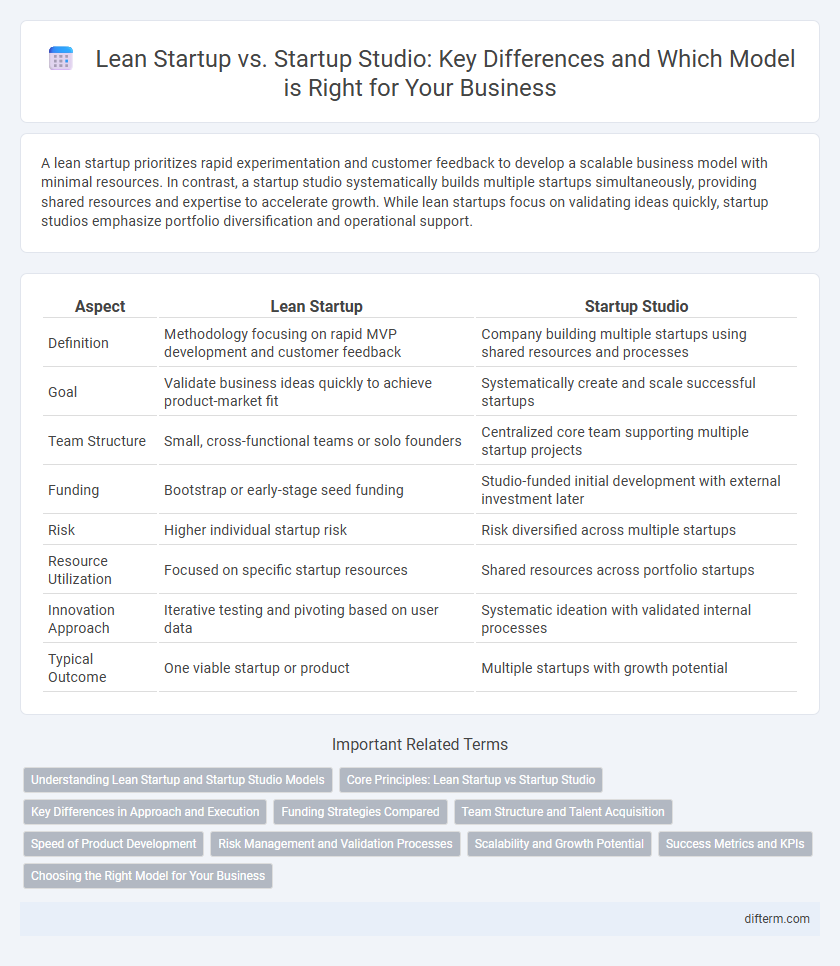A lean startup prioritizes rapid experimentation and customer feedback to develop a scalable business model with minimal resources. In contrast, a startup studio systematically builds multiple startups simultaneously, providing shared resources and expertise to accelerate growth. While lean startups focus on validating ideas quickly, startup studios emphasize portfolio diversification and operational support.
Table of Comparison
| Aspect | Lean Startup | Startup Studio |
|---|---|---|
| Definition | Methodology focusing on rapid MVP development and customer feedback | Company building multiple startups using shared resources and processes |
| Goal | Validate business ideas quickly to achieve product-market fit | Systematically create and scale successful startups |
| Team Structure | Small, cross-functional teams or solo founders | Centralized core team supporting multiple startup projects |
| Funding | Bootstrap or early-stage seed funding | Studio-funded initial development with external investment later |
| Risk | Higher individual startup risk | Risk diversified across multiple startups |
| Resource Utilization | Focused on specific startup resources | Shared resources across portfolio startups |
| Innovation Approach | Iterative testing and pivoting based on user data | Systematic ideation with validated internal processes |
| Typical Outcome | One viable startup or product | Multiple startups with growth potential |
Understanding Lean Startup and Startup Studio Models
Lean Startup methodology emphasizes rapid, iterative product development with constant customer feedback to minimize risks and validate business ideas efficiently. Startup Studio models build multiple startups simultaneously by providing shared resources, strategic guidance, and operational support to accelerate growth and increase success rates. Both approaches aim to optimize early-stage business development but differ in structure and scalability strategies.
Core Principles: Lean Startup vs Startup Studio
Lean Startup emphasizes rapid experimentation, validated learning, and iterative product development to minimize market risks and optimize resource allocation. Startup Studio focuses on building multiple startups concurrently, providing centralized resources, mentorship, and shared infrastructure to accelerate growth and improve success rates. Both models prioritize adaptability and customer feedback but differ in their approach to scaling and resource management.
Key Differences in Approach and Execution
Lean startups emphasize rapid iteration and validated learning through minimal viable products to reduce market risks, prioritizing customer feedback loops and efficient resource allocation. Startup studios operate by building multiple startups internally, leveraging shared resources, expert teams, and operational systems to scale ideas faster and diversify innovation efforts. The key difference lies in execution: lean startups focus on external market testing, while startup studios concentrate on internal venture creation and systematic company building.
Funding Strategies Compared
Lean startups prioritize minimal initial funding, emphasizing rapid prototyping and customer feedback to validate ideas before scaling. Startup studios operate with centralized funding pools, providing multiple ventures with sustained capital and resources to accelerate growth. The lean approach reduces financial risk by iterative investment, while startup studios leverage diversified funding strategies to support simultaneous project development.
Team Structure and Talent Acquisition
Lean startups emphasize small, cross-functional teams that rapidly iterate products to achieve product-market fit, often relying on founders and early hires with versatile skill sets. Startup studios build multiple startups simultaneously with dedicated, specialized teams and centralized talent acquisition processes to efficiently allocate experts across ventures. This structured approach in startup studios enhances scalability and resource optimization, contrasting with the lean startup's more flexible, founder-driven team dynamics.
Speed of Product Development
Lean startups accelerate product development by rapidly testing hypotheses through minimal viable products, enabling quick customer feedback and iterative improvements. Startup studios leverage experienced teams and shared resources to simultaneously develop multiple ventures, significantly reducing time-to-market across projects. Both models prioritize speed, but startup studios typically offer faster scalability due to structured, parallel development processes.
Risk Management and Validation Processes
Lean startups emphasize rapid prototyping and customer feedback loops to minimize market risk and validate product-market fit early, focusing on agile iterations and pivot strategies. Startup studios mitigate risk by launching multiple ventures simultaneously, leveraging shared resources and expertise to validate ideas through structured processes before scaling. Both models prioritize data-driven decision-making but differ in scale and approach to managing uncertainty and resource allocation.
Scalability and Growth Potential
Lean startups prioritize rapid experimentation and validated learning to achieve scalable growth through minimal viable products and customer feedback loops. Startup studios offer a higher scalability potential by leveraging centralized resources, experienced teams, and multiple concurrent ventures that share operational infrastructure. This integrated model accelerates growth by reducing startup failure rates and optimizing resource allocation across portfolio companies.
Success Metrics and KPIs
Success metrics and KPIs in lean startups emphasize rapid customer validation, focusing on metrics such as customer acquisition cost, churn rate, and minimum viable product (MVP) feedback loops to iterate efficiently. Startup studios measure success through portfolio diversity, the number of startups launched, capital efficiency, and the time to market for scalable ventures. Both models prioritize data-driven decision-making but differ in scale and resource allocation to optimize growth outcomes.
Choosing the Right Model for Your Business
Choosing the right model for your business involves evaluating the Lean Startup approach, which emphasizes rapid experimentation and customer feedback to minimize risks and optimize product-market fit, against the Startup Studio model, which provides a structured environment to build multiple startups simultaneously with shared resources and expert guidance. Lean Startup suits entrepreneurs seeking agility and cost-efficiency, while Startup Studios benefit founders looking for comprehensive support, mentorship, and operational scalability. Assessing your business goals, resource availability, and market dynamics helps determine the optimal framework to accelerate growth and innovation.
lean startup vs startup studio Infographic

 difterm.com
difterm.com